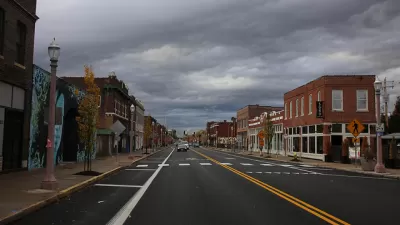The city of St. Louis is in the midst of an intense political debate—with mayoral consequences—on the subject of development incentives, which critics say just help the rich get richer.

According to an article by Jacob Barker and Koran Addo, mayoral candidates in the city of St. Louis have found an issue they can agree on: the need to reform development incentives.
According to the article, "public incentives such as property tax abatement and tax-increment financing that often subsidize [redevelopment] projects are under growing scrutiny, and candidates running to be the city’s new mayor agree that some changes in approach are overdue."
The concerns of the seven remaining mayoral candidates echo the controversies surrounding development incentives in Chicago, according to the article:
Concerns have mounted over the amount of city and school district revenue being returned to the developments, estimated at some $709 million between 2000 and 2014. Others worry the incentives mainly benefit the city’s central corridor, where most development occurs.
Outgoing Mayor Francis Slay committed to reform of the city's current system of development incentives back in October 2016, acknowledging that some projects received benefits that could have afforded to proceed without the incentives, forcing the city to forgo possible sources of revenue.
Meanwhile the issue remains a hot button for some candidates for the Mayor's Office who have voted for development incentives as previous stops in their political career.
FULL STORY: Mayoral candidates agree reform of St. Louis development incentives overdue

Study: Maui’s Plan to Convert Vacation Rentals to Long-Term Housing Could Cause Nearly $1 Billion Economic Loss
The plan would reduce visitor accommodation by 25,% resulting in 1,900 jobs lost.

North Texas Transit Leaders Tout Benefits of TOD for Growing Region
At a summit focused on transit-oriented development, policymakers discussed how North Texas’ expanded light rail system can serve as a tool for economic growth.

Why Should We Subsidize Public Transportation?
Many public transit agencies face financial stress due to rising costs, declining fare revenue, and declining subsidies. Transit advocates must provide a strong business case for increasing public transit funding.

How to Make US Trains Faster
Changes to boarding platforms and a switch to electric trains could improve U.S. passenger rail service without the added cost of high-speed rail.

Columbia’s Revitalized ‘Loop’ Is a Hub for Local Entrepreneurs
A focus on small businesses is helping a commercial corridor in Columbia, Missouri thrive.

Invasive Insect Threatens Minnesota’s Ash Forests
The Emerald Ash Borer is a rapidly spreading invasive pest threatening Minnesota’s ash trees, and homeowners are encouraged to plant diverse replacement species, avoid moving ash firewood, and monitor for signs of infestation.
Urban Design for Planners 1: Software Tools
This six-course series explores essential urban design concepts using open source software and equips planners with the tools they need to participate fully in the urban design process.
Planning for Universal Design
Learn the tools for implementing Universal Design in planning regulations.
City of Santa Clarita
Ascent Environmental
Institute for Housing and Urban Development Studies (IHS)
City of Grandview
Harvard GSD Executive Education
Toledo-Lucas County Plan Commissions
Salt Lake City
NYU Wagner Graduate School of Public Service





























